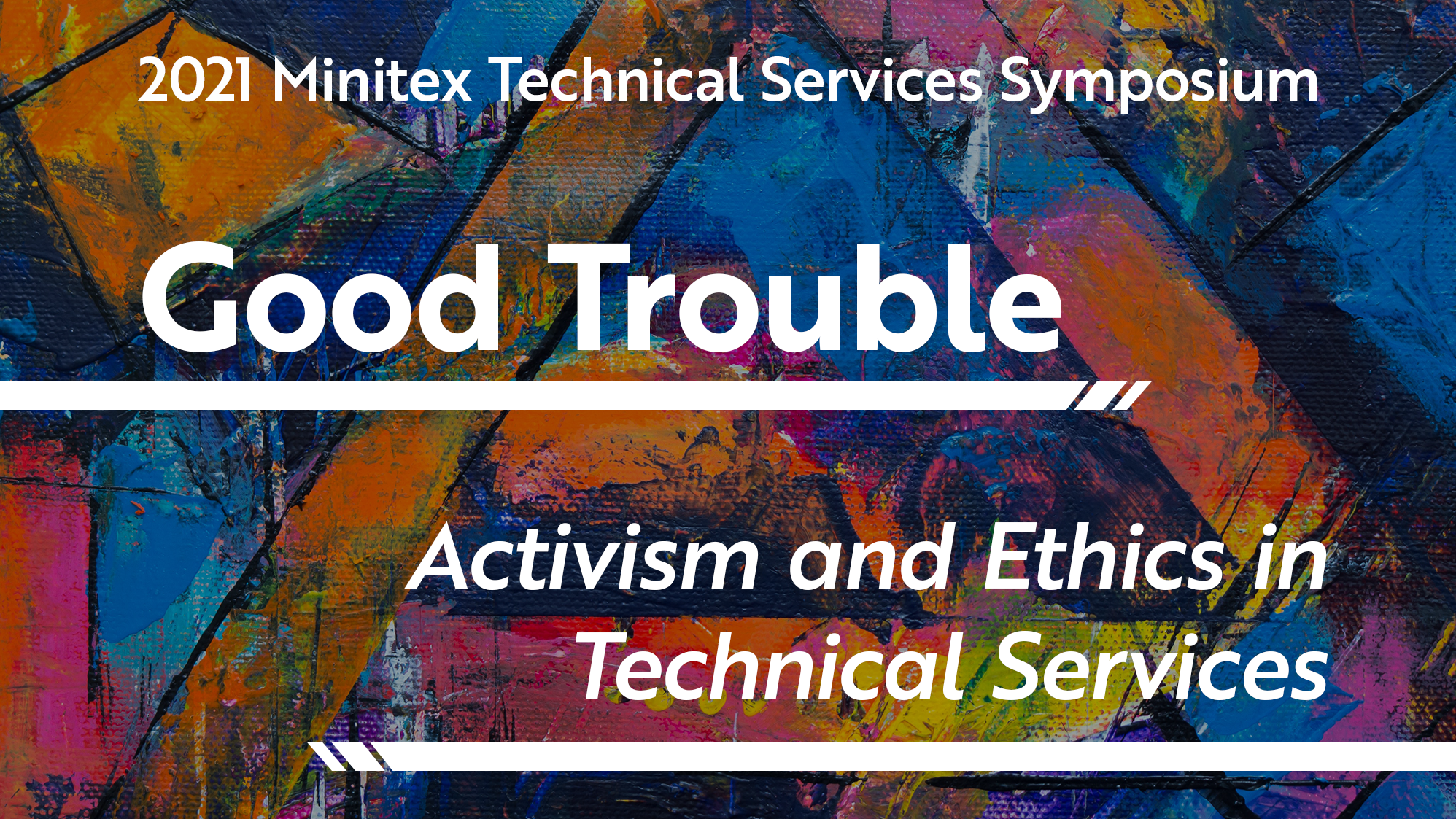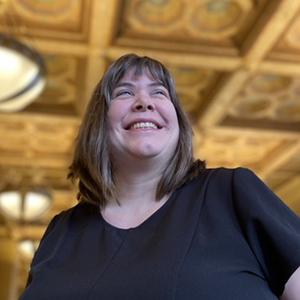- Took place Nov 9, 2021
Note: Scholarships are available for staff from underrepresented libraries, cultural heritage organizations, and students studying Library and Information Science. Contact Sara Ring (ring0089@umn.edu) for more information if you're in need of scholarship assistance.
This year's Minitex Technical Services Symposium theme is Good Trouble: Activism and Ethics in Technical Services. It will take place virtually on November 9, 2021.
Late Congressman John Lewis encouraged us to get into “good trouble” - making waves and causing disruptions in the name of progress. How does that show up in our work in technical services? Join colleagues to hear from some of the people on the front lines of technical services activism and learn about more ways to get involved.
Program
The program begins at 8:30 a.m. (Central Time) with a welcome and keynote presentations, followed by breakout sessions. The day will conclude at 3:45 p.m. with a round robin of closing reflections by presenters.
Keynote Beth Shoemaker
Scruples and Hoopla: Ethical principles into ethical actions
A handful of codes of ethics provide a framework for thinking about ethics for library workers. How can we navigate ethical principles and how do we turn those noble and idyllic ideas into daily practice? I’ll offer thoughts about what codes of ethics say about us as technical services workers, how we can start workplace conversations about ethical work, communicate with coworkers outside technical services and ideas for implementing professional ethics across a variety of possible library environments.
Beth Shoemaker Bio
Beth is the Rare Book Librarian at Emory University’s Stuart A. Rose Manuscript, Archive & Rare Book Library in Atlanta. Her work includes cataloging, collection development, teaching and curating exhibits in the Emory Libraries. Her research interests include how practicing catalogers approach ethics in the workplace. Since its formation in 2018, she has been co-chair of the Cataloging Ethics Steering Committee, which released a final draft of the Cataloguing Code of Ethics in January 2021. Beth is a graduate of the University of Illinois Graduate School of Library and Information Science.
Keynote Kenda Zellner-Smith
Save the Boards is a passion project focused on the preservation work of boards and murals created in Minneapolis after the murder of Geroge Floyd. The creation of boards and murals in Minneapolis inspired cities and communities across the nation to stand in solidarity with similar acts of visual expression. With little to no background in art collection, preservation, and organizing, Minneapolis native and founder of Save the Boards, Kenda Zellner-Smith, actively engages with local businesses, schools, and audiences about the significance of Mpls boards by participating in local events and speaking engagements.
Kenda Zellner-Smith Bio
Life-long Southsider and founder of Save the Boards Minneapolis, Kenda Zellner-Smith has contributed to the preservation work of over 800 plywood boards and murals created after the murder of George Floyd by Minneapolis police. Driven by the panic she felt as she watched these pieces of art created by Twin Cities artists and community members alike disappear as quickly as they came, Save the Boards began by enlisting the help of friends and volunteers to call local businesses, pass out flyers, and by roaming the streets of Minneapolis in search of boards before they were otherwise discarded.
Zellner-Smith jumped into this project with the understanding that the boards alone would not generate the change and accountability Mpls community members have been desperately pleading for but instead, recognized the boards could be used as tools of learning, reflection, and healing by keeping them physically accessible within the community with which they were created in and for. Zellner-Smith plans to continue exploring creative ways to activate this art as a means to demand change. Through AR/VR technology Save the Boards plans to continue facilitating the importance of protest and street art by creating intentional space for the boards and murals of Minneapolis to live on in, long after the physical boards move into their next phase of life.
Keep up with STB preservation work on Instagram @savetheboardsmpls and online at savetheboards.org.
Breakout Sessions
11:45 a.m. - 12:30 p.m. (Central Time)
Recognizing the Extraordinary in the Ordinary: Ethical Co-working in Technical Services
Caterina Reed, Instructional Support Associate for Content Acquisitions and Services, Stony Brook University Libraries
Professional librarianship standards, such as the ALA Code of Ethics, embrace values of diversity and accessibility, but these are values often extended to library users. Do we consider accessibility and inclusivity of our colleagues, particularly within Technical Services? This presentation will discuss the negative impacts of a lack of inclusivity and empathy within Technical Services. Strategies in morale-building and how to be a better ally to marginalized colleagues will be provided. The ethical imperative to be an empathetic and respectful colleague will also be discussed. Participants are strongly encouraged to share their own workplace experiences in this safe space.
Easy Ways to Decolonize the Catalog
Bobby Bothmann, Cataloging & Metadata Librarian, Minnesota State University, Mankato
This session will look at some small projects that make it easy to begin decolonizing your catalog, from finding classification numbers that recently changed the N Cutter for Negro to B for Blacks/African Americans to methods for updating new and existing records with culturally sensitive vocabularies such as Homosaurus and alternatives for Indigenous peoples.
1:30 p.m. - 2:15 p.m. (Central Time)
You’ve Got Accessible Resources: Can Your Users Find Them?
Violet Fox, Cataloging and Metadata Expert; David Norris, Cataloging and Metadata Librarian, St. Catherine University
The Library Bill of Rights posits that libraries and their resources should be free and available for all to use. However, are resources truly free if users can’t find them? MARC fields dedicated to more effectively conveying accessibility information (such as those designating large print books and captioned videos) were implemented in 2018, but not many catalogers are using them or even know that they exist! Join us as we talk through options for recording information about accessible resources in your library and discuss strategies for urging vendors to display this vital information.
Using SNAC to Highlight Women's Voices in Archival Description
Libby Hertenstein, Cataloger & Metadata Librarian, Bowling Green State University
My presentation will focus on the beginnings of a project to highlight women's voices from Bowling Green State University's Center for Archival Collections finding aids by using the SNAC (Social networks and archival context) database. Women's voices are often forgotten in archival description because they may be mentioned in passing in favor of a husband, father, brother, or other family relation, who may be the main focus or creator of the collection. Further, because these women aren't necessarily "authors" they may not be appropriate candidates for Library of Congress Name Authority records leaving them "unknown" in authorities databases, thereby ignoring their often valuable contributions and silencing their roles within collections.
Further topics covered in the presentation will include an introduction to SNAC, a discussion of how to identify under-represented voices in finding aids, how to input information into SNAC and finally, a discussion on the ethics of adding people to authorities databases who may be living or dead.
2:30 p.m. - 3:15 p.m. (Central Time)
From the Back Room to the Front Line: Integrating DEI Primary Sources for Discovery
Faye Mazzia, Electronic Resources Cataloger Librarian and Ying Zhang, Associate Director of Collection Services & Resource Management, University of Central Florida Libraries
As part of our sustaining commitment to diversity, equity, and inclusion (DEI), the University of Central Florida Libraries has acquired several primary source collections from vendors such as Adam Matthew, Gale, and ProQuest. The content of these collections could greatly support the DEI initiatives and the teaching and research at the University. However, the lack of descriptive titles, metadata inconsistencies across collections, and potentially sensitive terms and material often make it challenging for users to discover the richness of resources.
To promote the awareness of these DEI-focused collections, the Library technical services team is exploring ways to increase exposure and usage of these resources, such as adding more granular bibliographic records at the individual document level to the catalog. This presentation covers strategies that librarians in the technical services are developing to evaluate, select, incorporate, and enhance metadata and bibliographic records to the catalog while considering user experience, metadata, and integration with the institution’s library system.
Demographics of Cataloging and the New White Man's Burden
Preston Salisbury, Assistant Professor and Monographic Cataloger, Mississippi State University
Librarians in general and catalogers, in particular, have come to realize that the library catalog contains racist, insensitive, and outdated terminology, in addition to being organized in a way that makes it, by default, a white space. Fixing this problem is the responsibility of the current generation of catalogers. However, the demographics of cataloging departments frequently place an undue burden upon catalogers of color, which is already a small minority within the profession.
The solution is to upend the former cultural doctrine of the "White Man's Burden" and to place the burden of inclusive cataloging not on the minority, but on the white majority within the profession. The presenter (a white man himself) will outline steps that white catalogers everywhere can take to make their work more inclusive and anti-racist, as well as provide advocacy for people of color within the profession.
Planning Committee
Contact the planning committee with any questions at tss-plan-comm@umn.edu.
- Lizzy Baus, Macalester College (Chair)
- kalan Knudson Davis, University of Minnesota Libraries
- Sarah Ethier, Scott County Library
- Keri Ostby, Rochester Public Library
- Sara Ring, Minitex

